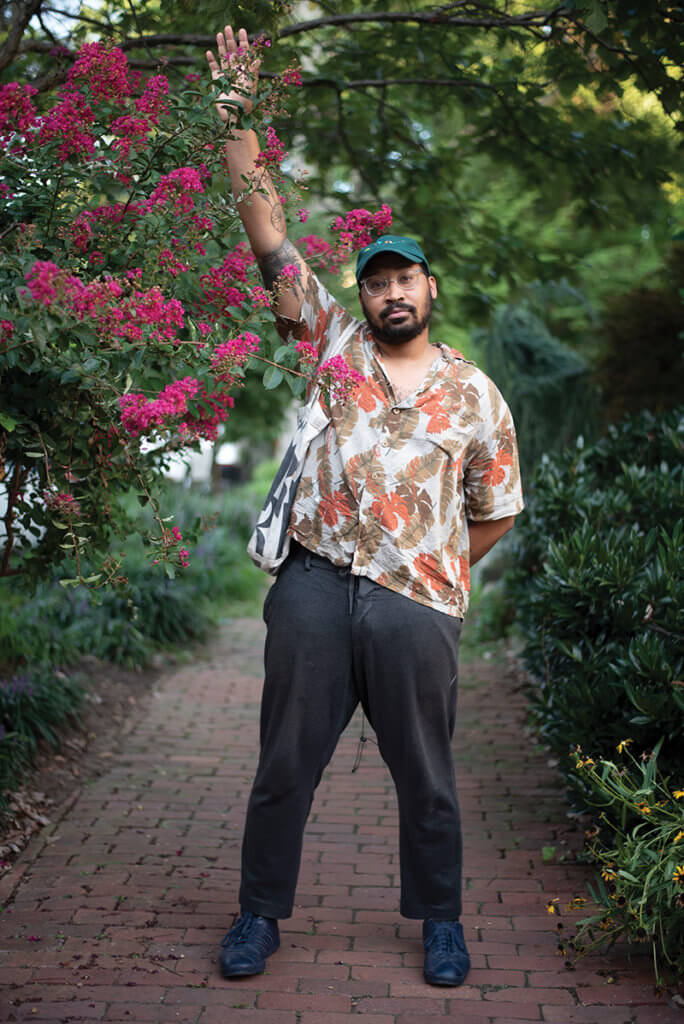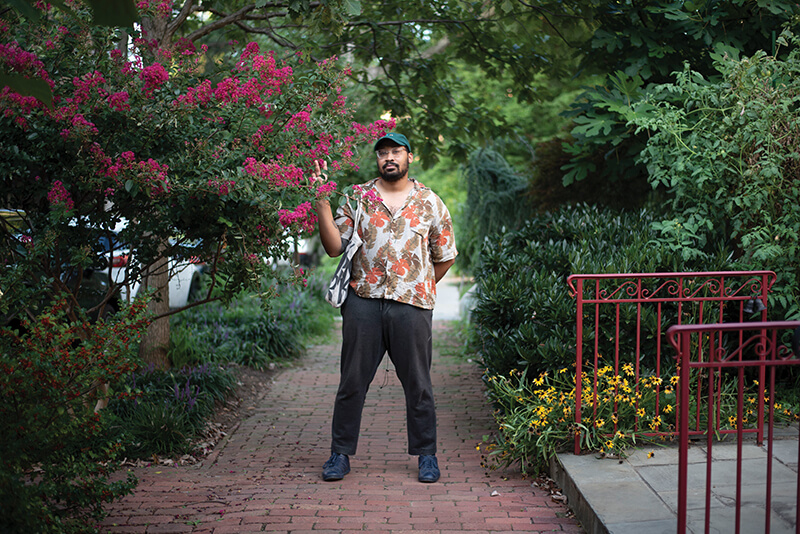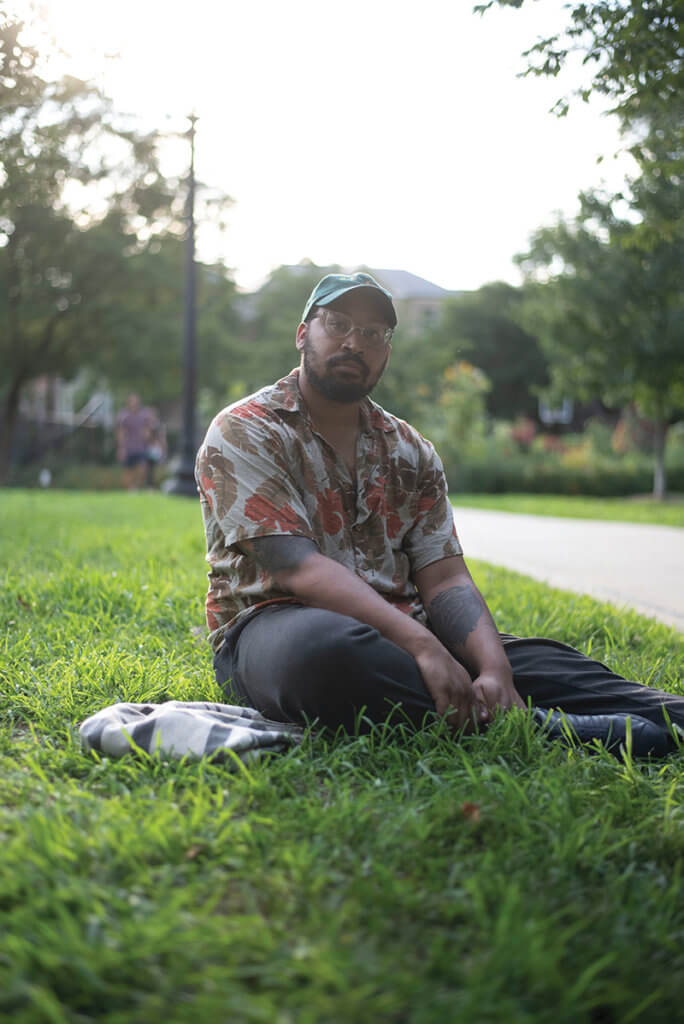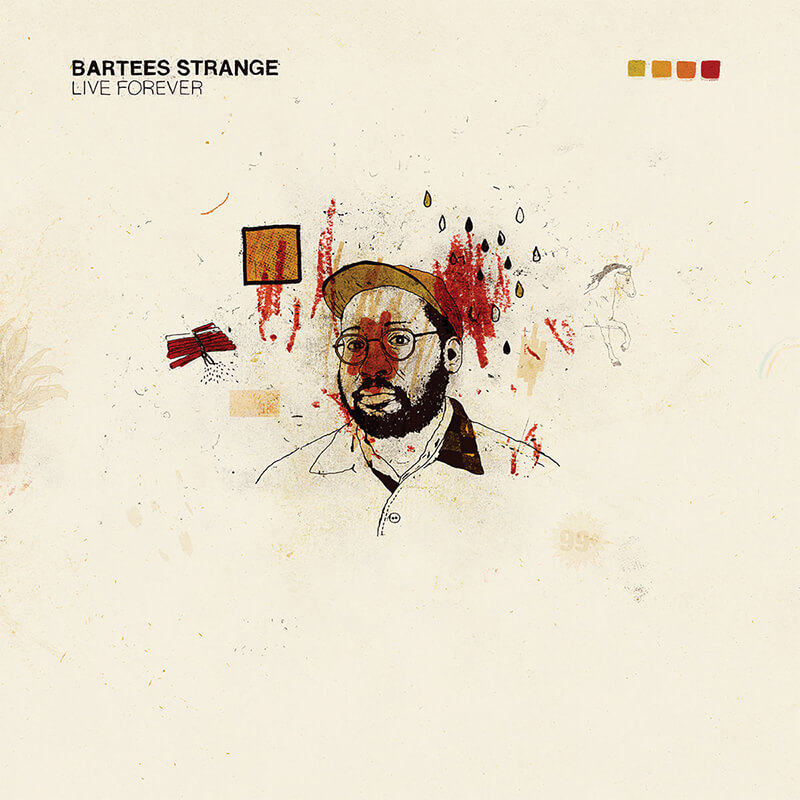Bartees Strange is having quite a year.
Heaps of critical praise, commercial attention, and vocal fandom have been directed at Bartees and his two 2020 releases: Say Goodbye to Pretty Boy, a deft reinterpretation of ten songs by The National, and Live Forever, a complex, joyous mix of rock, hip-hop, and jazz.
Strange (Bartees Cox, Jr. when he’s offstage) bounced around the U.S. and overseas as a kid and spent his formative years in rural Oklahoma, an experience that permeates Live Forever. Now living and making music in Washington, D.C., Strange took a measured path to life as a full-time musician/producer. That deliberate, incremental pace makes his success – and his music – all the more impressive.
Bartees spoke to Performer about this thoughtful approach to creativity, demystifying the recording process, and his love for the weird, wonderful Fender VI.
This interview has been edited for length and clarity.
One of the reasons I’m talking to you now is that you recently posted on Twitter about wanting to be interviewed about gear. What made you put that into the universe?
Because everyone wanted to talk about the record – and I love my album, but I think the thing about it that is the coolest to me is like, how it was made, and the people who were involved.
I think there’s a lot of fear around making your own records and producing your own things and doing stuff with your friends. I feel like people get to a point where they want to make a record, and they’re like – ‘Okay – I’ve got to spend all this money, and I’ve got to get the right people,’ and all this stuff. But like – No. I mean, Live Forever was made in a one room barn with my friends. That’s fine. [laughs] I guess I’m always down to try to demystify the recording process so that more people understand that they can – that money doesn’t always have to be a barrier to making something that’s meaningful.
Both records sound incredible in distinct ways. Did you have a particular sound you were going for ahead of time?
Yeah, I think I had a direction. I knew what I wanted them to sound like, but I definitely wasn’t successful in getting to all those sounds. But I found other things. I think that’s also a big part of recording: everyone has that picture in their head of what they want – but other things can also make it work.

I feel with music, people put so much attention on the gear you use and how things sound and the quality of the recording. When really, the thing that’s going to make that record hit hard is if the song is good. [laughs] I felt that with Live Forever. There were points when I would get to a song, and I’d be like, ‘Damn – this does not sound like I was hoping it would sound.’ [laughs] But it’s doing something different that I didn’t know that I wanted. And it’s working – it’s totally working.
The emotional goal of the song is being met, and so I went with it. I’m glad I did that instead of continuing to tweak. Because I could have potentially tweaked myself into a world where that record never came out. You’ve got to trust the song and just kind of go with it, you know?
I saw you recently picked up a Fender VI. How has that been?
Yo – it’s the greatest shit. [laughs] It’s the greatest instrument ever. I’m so sold on it. I saw some guy playing one at a coffee shop years ago, and I just was like, ‘Oh, you’re playing a Jaguar…’ And you’re sitting around like, ‘Wait, what is that?’ You know, it’s just so weird…
I’ve been looking for one for so long and like they’re incredibly expensive. [laughs] A Custom Shop [version] is like five grand, and an original one from the ’60s is like ten grand. And the Squire is four hundred bucks – I’ve played a few and they’re cool, but…it’s not the thing [laughs]. I recently found one. This guy was selling one at the local guitar shop for a very affordable price, and I scooped it up. [laughs]
I loved your recent conversation with Jesse Cannon, especially around the incremental nature of your “overnight” success. Is there anything you’d add on to that – just how thoughtful you were about releasing these two records and everything that went into it?
Oh man – like I said to Jesse, so many times throughout my life, I was just like – ‘Dude, this is not going to work out.’ [laughs] So many times in life I knew – I was sure it would never work out. And I found that people started to appear that told me, ‘No, it is going to work out. You just got to keep moving. Keep getting better. Keep learning things. Keep writing things.’
I kind of had the realization that whether this shit really pops off – or it doesn’t – I think I’m always going to want to make things. Once I came to that realization, I was like, ‘Okay. It doesn’t have to work out.’ I’m going to be doing this regardless. Once I hit that point of – I’m just making stuff I want to hear, I just kind of was like, ‘Fuck it. If you like what I’m doing – great, hop on the train, let’s ride.’ I don’t need everybody. I just need a few people that really get it, you know? I would just encourage everyone to just – think of the things you make that way. If you put out a few records and no one likes them – that’s okay. [laughs] I’ve put out so much music that no one will ever hear. And that’s okay. It got me here.

It’s like – people who get really upset about not having more success in their early twenties or mid-twenties – and I’m like, ‘That’s okay.’ I was homeless for a year. I was out here…really struggling. Trying to make it work and going from job to job, just trying to find myself. I had to go through all of that to get here. And I don’t think that I would be as prepared for the things that are coming if I didn’t go through those things.
I really think that regardless of the challenges people may face – creative people may face – making things is so important. Making things is what excited me about waking up the next day when nothing else could. I really think – success, recognition – that stuff is going to come. But making things – whether it’s music or film, or whatever you’re creating – you got to be making it for yourself first.
Oftentimes, you’re going to know you have something before anyone else does. And if it’s very good, a lot of people aren’t going to want to help you! [laughs] They’re going to be a little jealous, or they’re just not going to know what to do. That doesn’t mean that what you’ve done doesn’t mean anything. It just means you haven’t found the right person yet.
There are no endings – everything just leads to the next thing. You keep on trying new things. You keep trying. That’s what I would say to everybody. [laughs]
Your commencement address. [both laugh] I love it.
Yeah, that’s what I do. [laughs]
To leave off, has there been anything catching you lately – either a new piece of gear that’s inspiring you or something making you want to write?
Honestly, no, not on the gear front. More on the arrangement front. I really want to try more resampling. ‘Okay, we’re going to do a rock song. I’ve tracked the drums; I’ve tracked the bass; I’ve tracked the guitar, and this shit’s hitting. It sounds great.’ I want to take all that quantize it, put it on an [Roland] SP – like on a pad, and trigger the whole chorus…or trigger every eight bars.
So, the entire instrumentation is now just being triggered through a pad hitting with the same attack as like a kick drum or a snare drum would hit. It’s like triggering an orchestra in a way. I want to write rock songs that are basically programmed like rap songs, if that makes sense. I think that could be really cool.

I heard Heaven to a Tortured Mind by Yves Tumor. I was like, yo – like, “Gospel for a New Century,” the way that that songs starts…it’s stupid – so good. I’ve never heard anything like it, and it sounds like they literally triggered the whole song on a sampler pad – and then they took it off. Then they trigger it again. It’s like, the on and off-ness of it is just so aggressive and almost shitty – that it’s so unique and dope.
I’m jealous they did before I did. [laughs]
That can drive great art, right? Chasing what you’re hearing.
Yeah, I’m in love with that idea. So, I want to try it. We’ll see what happens.
Follow on Instagram @bartees_strange
Photos by Julia Leiby

